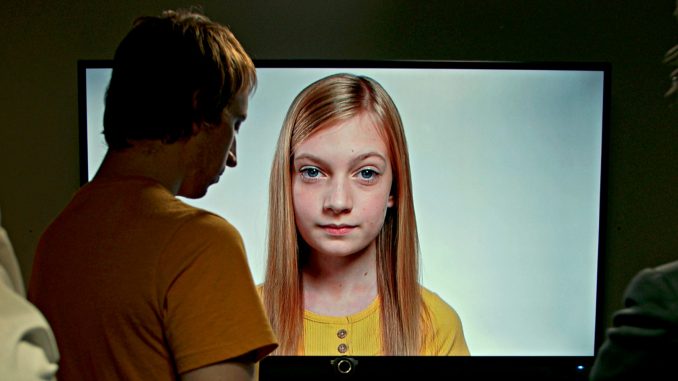AI Sci-Fi The Artifice Girl‘s Compelling Premise Hides Buggy Source Code

A pedophile-catching AI machine-learns its way to sentience in writer/director Franklin Ritch’s The Artifice Girl. But as compelling a premise as that may be, rife with grounded ethical issues more Black Mirror than Blade Runner, it values understated style over functional software. A small cadre of performers and a play-like production—split into three contained acts that leap decades and single-location settings—keep the indie charmingly subdued, but the movie is so literal when drawing attention to its own underdeveloped themes that it boldly challenges you to be ignorant of the genre’s most basic philosophical bullet points.
This first dipped toe into the world of conscious machines moves the hefty ideas associated with rapidly advancing technology away from the flashy pessimism of film noir and into the relatable self-consciousness of mumblecore. But in shifting subgenres, Ritch’s tell-not-show approach puts all its weight on its script—by far The Artifice Girl’s weakest element. When I critique telling and not showing, I still mean in the traditional sense. Seeing a Voight-Kampff test’s strain on a replicant is far more fun and effective than voiceover explaining the concept. But I also mean the more modern way afflicting some genre films. The way that fills the air with interminable speeches about trauma, gaslighting, racism, free will and all the other tough thematic brambles that—when not paid such crass vocal attention—could otherwise stick to our clothing when we walk out of the theater. But without any confidence in us, movies like The Artifice Girl just describe what it’s like to think about big issues, rather than inspiring us to think about them ourselves. We leave the theater with nothing but the ringing ears of being talked at for an hour and a half.
Of course, the whole 93 minutes aren’t like that. When programmer Garreth (Ritch) is initially locked in an interrogation room with Agents Deena (Sinda Nichols) and Amos (David Girard), the densely blocked and cross-talking performers buzz with electricity as we choke on the claustrophobia. Is Garreth truly trying to stop predators, or are his motives more murky? And what of his background in VFX, cheekily noting the digital necromancy he’s performed in the latest Star Wars? The strong opening act reflects its premise: Familiar, yet specific enough to ensnare us; just the right combination of genre elements and potboiled procedure. It’s also the section of the film that relies mainly on its older cast. Cherry (Tatum Matthews), Garreth’s AI, doesn’t yet have much to do. She appears on screen, a bemused little blonde girl with blue eyes, as a novel piece of visual storytelling. We analyze her face and speech, looking for falseness or truth. Telltale signs of humanity or machinery. She gets to be a piece of the plot rather than the film’s emotional and ideological center.
But as Ritch’s film advances by leaps and bounds in its second and third segments, more and more is put on Cherry’s sentience and Matthews’ performance. The older actors have the dual luxuries of experience and playing human beings—Ritch isn’t asking them to add affectations to his clunky script. But Matthews needs to be convincing yet uncanny. She needs to tease artificiality, then convey near-seamless super-humanity as the full extent of her abilities become apparent. Instead, she sounds rushed and without nuance. You can hear the script in her words. This comes to a head when opposite Lance Henriksen (playing an old Garreth) in the terrible final act. Ritch has her desperately screech on-the-nose monologues, while Henriksen’s seasoned gravitas makes it all seem even more cartoonish. It’s low-res Westworld, with its big creator-creation confrontation turned up to max volume.
-

-

-

-

-

-

-

-

-

-

-

-

-

-

-

-

-

-

-

-

-

-

-

-

-

-

-

-

-

-

-

-

-

-

-

-

-

-

-

-








































